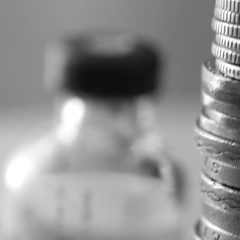
New Rationing Data Reinforces T1International’s Call for Insulin Price Cap
17 Oct 2022, 10:11 p.m. in #insulin4all USA, Global Stories, News & Statements by T1International
A recent study of 2021 National Health Interview Survey data demonstrates what #insulin4all advocates have been saying for years: too many people are dangerously rationing insulin due to cost. While insulin costs around $6 to manufacture, three companies dominate more than 90% of the insulin market and charge around $300 for a single vial of insulin.
The new study shows that 1.3 million people living with diabetes in the United States have noted that they ration insulin dosages or delay buying it because of its high cost. The study’s sample size of approximately 87,500 persons and comprehensive methodology adds to the existing data on rationing in the United States and globally. T1International’s 2021 out of pocket cost survey data found that 1 in 4 respondents reported rationing insulin within the last year and an even larger number of respondents had reported rationing blood glucose test strips. Costs and rationing of other essential supplies were also explored in T1International’s studies, though these topics were not covered by the National Health Interview Survey.
Notably, this latest study shows that rationing was most common among people without insurance, and other data shows that most people without insurance in the US are people of color. The study also showed that insulin rationing was 7.2% higher among Black insulin users than White and Hispanic users. This further underscores the need for federal US insulin price cap policies to lower the list price of insulin for everyone, including and especially for the uninsured, and the equity implications thereof. It continues to be made clear through stories and experiences shared by patient advocates, in addition to this increasing data, that capping the price of insulin for anyone who needs it - regardless of insurance status - will save lives.
The Inflation Reduction Act’s $35 insulin copay cap for Medicare beneficiaries goes into effect in January. It will support the National Health Interview survey respondents who are over 65 years old and rationing their insulin; however, it will not help the other 88.8% of respondents struggling with high insulin costs. Clearly much more needs to be done to make insulin affordable and accessible to those on private insurance and those without insurance.
This study wouldn’t have happened without the dogged organizing of #insulin4all advocates and T1International’s independent, industry-free research and data related to rationing since 2016. T1International’s out of pocket cost survey - the largest global survey of its kind led by patients - recently closed. The responses will soon be analyzed, with updated rationing and other diabetes-related data to be published in 2023.
***
If you’ve lost a loved one due to insulin rationing, consider connecting with Families United for Affordable Insulin (FUFAI). FUFAI is a T1International group that provides outreach, counsel and guidance for families grieving the loss of loved ones impacted by the insulin price crisis. It promotes affordable insulin for all who need it, and is facilitated by Nicole Smith-Holt, the T1International Ambassador, who lost her son Alec in 2017 to insulin rationing. Contact Nicole at nicole@t1international.com.
If you’d like to be further involved in our commitment to health equity through building better representation of people of color in our movement, apply to join our Communities of Color Working group. Contact USAChapters@t1international.com to learn more.
For other ways to take action on the insulin price crisis, visit www.t1international.com/volunteer.









